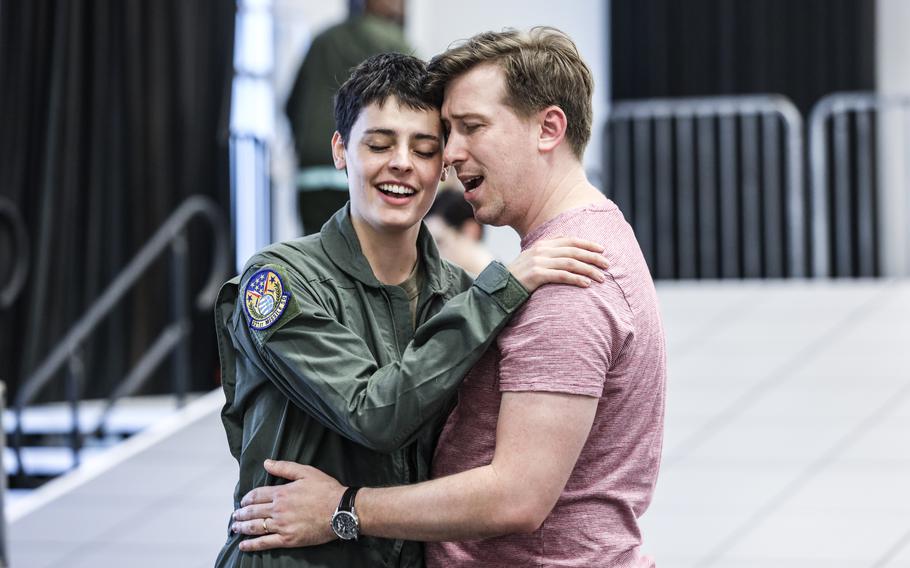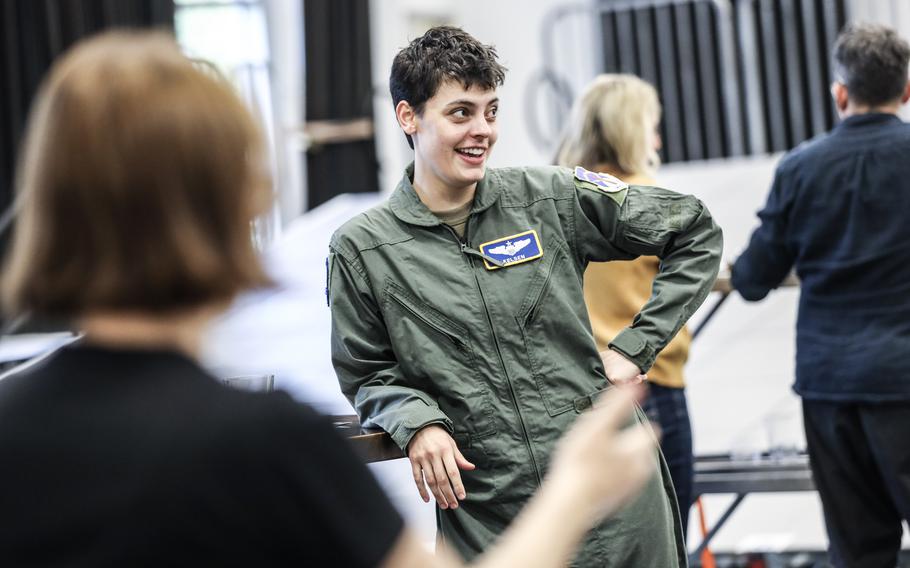
Emily D’Angelo, who plays Air Force drone pilot Jess Kelsen, and Joseph Dennis, who plays her husband, Eric, rehearse for Washington National Opera’s world premiere of “Grounded,” an opera by Jeanine Tesori and George Brant that examines the struggles of a female Air Force F-16 pilot who becomes a drone pilot after being grounded due to pregnancy. (Jati Lindsay)
Articles in Stars and Stripes helped George Brant get “Grounded” off the ground a decade ago.
The original one-woman play, first produced in 2013, is a monologue from an unnamed female Air Force F-16 pilot who becomes a drone pilot after being grounded due to pregnancy. As the play progresses, the pilot struggles to balance her mission targeting enemies overseas via a trailer in Las Vegas with her life at home with her husband and young daughter.
When Brant wrote the play — which is now an opera by the same name co-written by composer Jeanine Tesori and Brant and premiering with Washington National Opera at The Kennedy Center on Oct. 28 — he wanted to explore why drone pilots were suffering from post-traumatic stress at the same rate as fighter pilots. In 2013, a study released by the Armed Forces Health Surveillance Center concluded just that, and the topic has been revisited in numerous articles written before and since.
“This idea that the pilots were suffering from PTSD despite being drone pilots, and at the same rate as fighter pilots, was one that I really wanted to further explore and try to suss out why that might be,” Brant said. “And then also the idea that they did go home at night — that there weren’t barracks and that they had to reconcile their time at war during the day, and then potentially going home at night to your family and trying to reconcile those two worlds — was something that really intrigued me as well. And I did indeed read about that first in the Stars and Stripes.”
That article, published in 2009, describes how “the strain of the daily whiplash transition between bombs and bedtime stories, coupled with the fast-increasing workload to meet relentlessly expanding demand, is leading to fatigue and burnout for the ground-based controllers who drive the drones.”
“At the time that I wrote the play, a part of it was my moral concerns — about the moral implications of this technology that we had and how we were using it, and wanting to make sure we explored this morally before proceeding too far,” Brant said. “And it’s interesting that now it has become used globally. Certainly in the Ukraine conflict we’re seeing drones used left and right. I didn’t even know there was a naval drone now until a recent article about that — about Ukraine sinking one of the Russians’ ships. The field keeps expanding, so it definitely seems like the story has not become a museum piece by any stretch of the imagination.”

Emily D’Angelo, who plays fighter pilot Jess Kelsen, who is grounded because of pregnancy and reassigned as a drone pilot in the opera “Grounded,” rehearses in the Washington National Opera’s Takoma studio in Washington, D.C. (Jati Lindsay)
The military and veterans communities have embraced the play as well, with productions often featuring discussions and workshops. Brant recalled one of the first productions of the play, in San Francisco: “I mean, I was definitely holding my breath because I wasn’t sure what their reaction would be, and yeah, it was really gratifying to find that the service people who attended seemed to really respond to it. They just swarmed our actress afterward, and asking her all these questions.”
This will continue with the opera, which will be presented Oct. 28, Nov. 1, 3, 5, 11 and 13. Each performance will be accompanied by a pre-show lecture featuring Brant and Washington National Opera Artistic Director Francesca Zambello.
Additionally, the WNO’s Cafritz Young Artists will perform selections from “Grounded” followed by a panel discussion at the Military Women’s Memorial in Arlington National Cemetery at 5:30 p.m. Monday. The discussion will feature former Air Force fighter pilot Lt. Col. Tammy Barlette, who has logged more than 3,000 total flight hours and over 1,500 hours of combat support time in both Iraq and Afghanistan; retired Air Force pilot Maj. Scott Swanson; retired Col. Elspeth Cameron “Cam” Ritchie, current chief of psychiatry at Medstar Washington Hospital Center and a forensic psychiatrist with expertise in military and veteran’s issues; and Brant.
The WNO also partnered with The Elizabeth Dole Foundation for the Nov. 1 performance for “Courage in Service,” in which 100 members of the military community will be invited to a pre-show reception and a Q&A following the performance open to the entire audience.
“When this [play] was originally staged there was a lot in the news about [drone pilots], and for some reason we haven’t continued to talk about this new generation of soldier who comes out of their service experience having PTSD or other conditions associated with that service that are different than conventional warfare, where they’re on the ground,” Elizabeth Dole Foundation CEO Steve Schwab said. “My thinking is — and why we’re so interested in being involved in this — is because we want to have a sustained conversation over what the needs of our service members and veterans are when they do go through those experiences.”
Directed by Michael Mayer, the “Grounded” opera, which Brant said is “99% sung-through,” made a number of changes to the original play in order to better tackle these themes. The pilot, portrayed by mezzo-soprano Emily D’Angelo, now has a name — Jess Kelsen, who takes her last name from Stephanie Kelsen, an Air Force fighter pilot who was photographed while pregnant by portrait photographer Shlomit Levy Bard. That photo, featured in The New York Times, was another inspiration for Brant’s original play.

A promotional image for “Grounded” featuring Emily D’Angelo, who stars as Air Force pilot Jess Kelsen. (Washington National Opera)
The cast has expanded to include people who were mentioned in the one-woman play, including Jess’ husband, Eric (portrayed by Joseph Dennis); Jess’ daughter, Sam; Jess’ commander (Morris Robinson); and her trainer (Frederick Ballantine). A male chorus, the “Drone Squadron,” made up of Jess’ fellow flight squadron pilots, will reflect “the history of combat,” according to WNO. The set design, featuring two large screens that allow for real-time video projection, helps add to the immersive experience.
“The story gets increasingly trippy and surreal as it goes along, so we wanted to start it out as close to accurate as we could, before things take a turn for the strange,” Brant said. “… Certainly our movements — our choreographer has spent a lot of hours watching military marches and such, trying to get that flavor. Again, it’s not going to mimic exactly military marching, but trying to honor that and incorporate it into an artistic expression.”
The surreal element ties into the dissociative disorders or “split” that can sometimes be experienced with PTSD. In the opera, an alter-ego for Jess appears in the second act.
“There was one line in the original play where she says, ‘I am above me,’ ” Brant said. “And Jeanine, the composer, really ran with that idea and was like, ‘What if we have a whole character who embodies that idea?’ … It’s an opportunity as well to allow (D’Angelo) to sing with herself in a strange way and express things. And this other self sometimes can speak for her innermost thoughts maybe a little better than she can.”
Brant did not serve in the military, but has a long history of service in his family, he said. His father, George Brant Sr., served in the Judge Advocate General’s Corps in the Army during the Vietnam War, and his grandfather on his mother’s side, Robert Alexander, was in the Navy during World War II and was part of the group that captured the German submarine U-505 about 150 miles west of Rio De Oro, Africa, in June 1944. The capture marked the first time a Navy vessel captured an enemy vessel since the War of 1812, according to the National Museum of the U.S. Navy. The submarine is now on display at the Museum of Science and Industry in Chicago.
-copy.jpg/alternates/LANDSCAPE_910/80-G-49172%202%20copy.jpg)
The capture of German submarine U-505, June 4, 1944. Members of the boarding party from USS Pillsbury (DE 133) secure the tow-line to the bow of the captured German submarine, U-505. “Grounded” writer George Brant’s grandfather, Robert Alexander, was in the Navy and part of the group that captured the U-505, Brant said. (U.S. Navy/National Archives)
Still, Brant had help with keeping the opera, well, grounded in realism. Some people who have served in the military who were on the board of the Washington National Opera “chimed in with kind of keeping the story as honest as possible,” he said.
“We did have a line in the opera about — I can’t remember if it was ‘Air Force wings are good as gold,’ or something along those lines,” Brant said. “And an Air Force person pointed out that the wings are in fact silver, not gold, and that if I were to keep that in there I was going to tick off both Air Force and Navy people at the same time. So we did find a way to correct that line. … And it’s not — I don’t want people to enter this thinking it’s a documentary. There’s definitely imagination involved. … This is a fictional story, but we’re trying to get right as much as we can.”